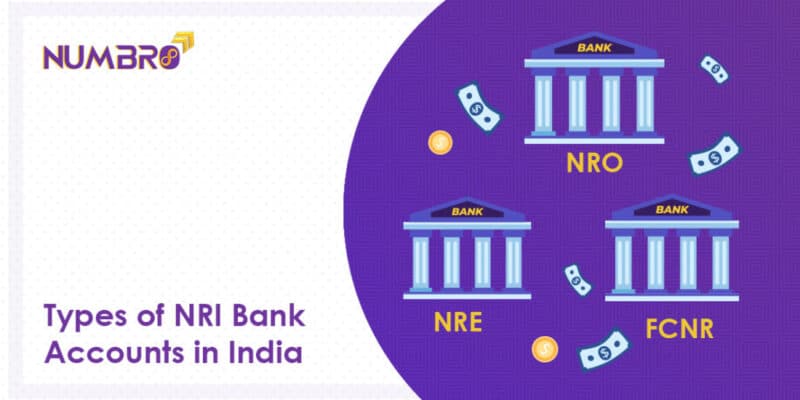Bank Accounts Maintained NRI
The most known bank accounts for non-resident Indians are Non-Resident External Account (NRE), Non-Resident Ordinary Account (NRO) and Foreign Currency Non-Resident Account (FCNR). NRIs can transfer or withdraw funds through these accounts. Check out our article Types of Bank Accounts in India for a detailed understanding of these accounts.
In this article, we would provide you with details of further bank accounts maintained by a non-resident Indian. Apart from the accounts mentioned above, a non-resident Indian can maintain the following types of bank accounts based on their requirements –
- Foreign Currency Non-resident Deposit Account
- Foreign Currency Non-resident Account with Forward Cover
- Resident Foreign Currency Account
- Exchange Earner’s Foreign Currency Account
- Resident Foreign Currency Domestic Account
These accounts are in the nature of the current account and help non-resident Indians to maintain their monies in the form of foreign currency rather than converting into domestic currency (INR). This helps an NRI to avoid exchange risk or other charges applicable for inward or outward remittances done.
various aspects and conditions to be fulfilled for opening these bank accounts:
Foreign Currency Non-resident Deposit Account –
- As the name suggests it is a deposit account for a non-resident Indian. It is similar to a fixed deposit account. Tenure of the FCNR deposit account is for a minimum of one year to a maximum of five years. A non-resident is allowed to pool his foreign currency savings to this deposit account.
- The RBI regulates the interest rates of the FCNR deposit and are the same across all the banks. Since the deposit period is for one year, no interest is payable for a pre-mature withdrawal before one year.
Foreign Currency Non-Resident Account with Forward Cover –
- As the FCNR deposit account attains a low rate of interest, the banks have come up with the option of forward cover to increase the yield on FCNR deposits.
- The investors look for a high rate of return on their investments but cannot predict the exchange rate fluctuations because of the volatility of rupee. There is always a risk factor of currency depreciation on forex investments.
- In this case, the investor enters into a forward contract with the bank to exchange the foreign currency at a pre-determined exchange rate in the future.
- The forward contract fixes the rupee return on the FCNR deposit and any future movements in the currency markets cannot affect the return of the investor.
- The only loophole in this kind of deposit is, even if the rupee rate appreciates, an investor is stuck with the forward rate and is liable to a penalty if he wishes to exit out of the forward contract.
- Interests earned on FCNR deposits are exempt from tax as interest includes hedging transactions on account of currency fluctuations, taxation of gain due to entering into a forward contract as per explanation 2 of section 10(15)(iv).
Resident Foreign Currency Account (RFC)–
- It is an account maintained by non-resident Indians returning to India on a permanent basis and attaining resident status.
- He can transfer all his funds abroad into this account before returning to India. He can maintain this account in any freely convertible foreign money.
- It can be opened either in current, savings or term deposit form.
- The interest rate rates are usually are in correspondence to the FCNR account and there is no limit on the term of holding monies in an RFC account. An account holder can open an RFC deposit even lesser than one month. But there is a penalty levied for any pre-mature withdrawal of funds.
- There are certain prescribed permissible credits and debits into an RFC account, such as –
- Permissible Credits are – Inward remittances, foreign income, foreign currency drafts, unspent foreign exchange, transfers from NRE, FCNR or other RFC accounts.
- Permissible Debits are – any current account transactions, approved capital account transactions, foreign remittances, investment in foreign securities and also for making local remittances.
- Loan or overdraft facility is not allowed against an RFC deposit account.
- As interest accrued on deposits in foreign currency to a non-resident or to a person not ordinarily resident is exempt from tax, similarly, interest earned on an RFC deposit account is also exempt from tax.
- In case the person wishes to shift back to foreign countries, the balance in this account can be transferred to NRE or FCNR accounts again on application to the banks.
Exchange Earner’s Foreign Currency Account (EEFC) –
- As the name suggests, it is an account opened by a person earning foreign exchange to be maintained in foreign currency. Usually, these accounts are accessible to exporters.
- Any person residing in India receiving inward remittances or a company with foreign currency earnings can open an EEFC account. It facilitates any exporter or professional to retain their foreign exchange receipts in banks without converting funds into local currency.
- An EEFC account is in the nature of the current account and can be maintained in any convertible foreign currency. It is also a non-interest-bearing account and can be held singly or jointly.
- Similar to an RFC account, an EEFC account too has certain permissible credits and debits –
- Permissible Credits are – Payment received for the export of goods and services including any advances received
- Permissible Debits are – any permissible current account and capital account transactions, payments towards import of goods and services, custom duty, trade-related loans or advances to an importer customer outside India or to a supplier of goods and services in India, payments can be made for the maintenance of any branch or office abroad.
- The balance in an EEFC account at the end of every month should be converted into INR after adjusting for approved purposes and forward commitments.
- As an EEFC is a non-interest-bearing account there is no income generated from this account. As there is no income there is no tax liability as well.Resident Foreign Currency Domestic Account (RFCD) –

Resident Foreign Currency Domestic Account (RFCD) –
- It is an account maintained in foreign currency by residents of India for any foreign exchange received abroad or domestically.
- Unlike the RFC account, RFCD account is a non-interest-bearing current account held by a resident of India either singly or jointly.
- This account is essentially opened for maintenance of foreign exchange transactions and there is no limit on balanced kept in this account.
- There are certain permissible credits and debits for an RFCD account too, such as –
- Permissible Credits are – Foreign exchange earned through gift from a close relative, settlement of lawful obligation from non-residents, gift or honorarium while on visit outside India, earnings through export of goods and services, unspent amount on foreign travel etc.,
- Permissible Debits are – any permissible current account and capital account transactions including travel, medical treatment, gift, education, online purchases, etc.
- An RFCD account is in the nature of current account. Thus, no income is payable or nor any income is generated. Since, there is no income earned on this account, there is no taxability aspect too.

* vulputate eu scelerisque sit amet just

* vulputate eu scelerisque sit amet just
We have understood the different types bank accounts in detail. For your understanding below is the comparison of the main aspects of the accounts for your easy understanding to determine which account to be opened for based on your respective needs:
| S.NO | Particulars | FCNR Deposit A/c | FCNR with Forward Cover | RFC A/c | EEFC A/c | RFCD A/c |
| 1 | Nature of Account | Deposit A/c | Deposit A/c with forward cover | Savings, Current or Term e Depo | Current A/c | Current A/c |
| 2 | Minimum and Maximum term of account |
Min – 1 Max – 5 |
Similar to FCNR deposit A/c but with forward cover | No Limit | Not Applicable | Not Applicable |
| 3 | Primary Permissible Credits | Foreign currency savings | Foreign currency savings | Transfers from NRE or FCNR accounts | Remittances from export of goods and services | Foreign exchange earned through transactions outside India. |
| 4 | Primary Permissible Debits | Not applicable as it is in nature of FD account | Not applicable as it is in nature of FD account | Current account transactions | Current a/c transactions and payment towards imports | Permissible current and capital a/c transactions |
| 5 | Loan or Overdraft facility against the account | Not Allowed | Not Allowed | Not Allowed | Not Allowed | Not Allowed |
| 6 | Is it an interest-bearing account? | Yes | Yes | Yes | Yes | Yes |
| 7 | Is income generated from the account taxable? | Exempt | Exempt | Exempt | Not Applicable | Not Applicable |




